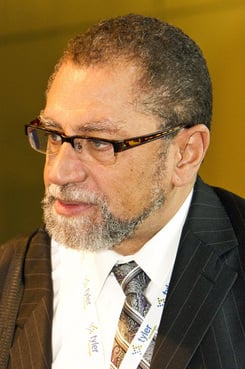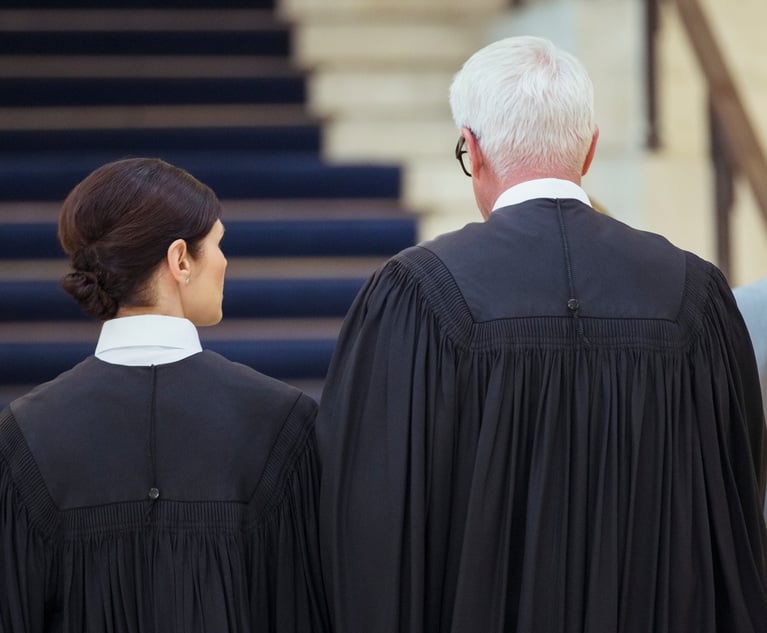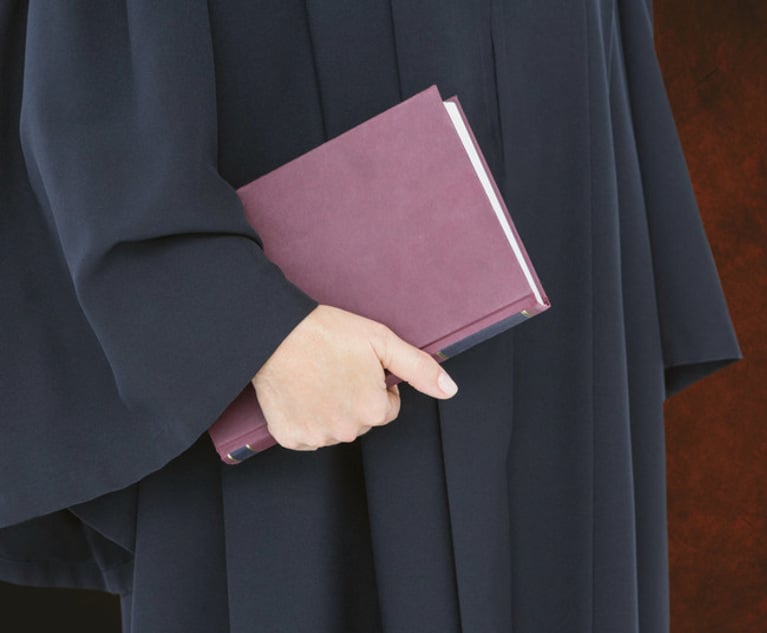Lifetime Achievement: Senior Judge Alford J. Dempsey Jr.
"My proudest achievement in the law is, whether they win or lose, lawyers and litigants leave my court feeling they have been treated fairly."
June 19, 2019 at 02:00 PM
6 minute read
 Judge Alford “Al” Dempsey Sr., Fulton County Superior Court. (Photo: John Disney/ALM)
Judge Alford “Al” Dempsey Sr., Fulton County Superior Court. (Photo: John Disney/ALM)Through a career that included stints driving a truck, singing in a band and representing the city of Atlanta, Senior Judge J. Alford Dempsey Jr. made his mark on Fulton County Superior Court by working in its fledgling division for noncomplex criminal cases.
“I'm not the send-back man; I'm the dispose-of-it-while-we-got-it man,” Dempsey told a lawyer in 2009. “If it's on the calendar, it's got to go—not back but through.”
His work led to a notable decrease in the court's caseload.
Dempsey was raised in Atlanta, the son of two state workers. As Greg Land reported in a 2009 profile, he was pushed to excel academically and sent to high school at New Hampshire's New Hampton School for Boys. Upon graduation, he enrolled at Columbia University, which would soon become swept up with the anti-war protests during the 1960s.
He came back to Atlanta and worked in nightclubs for bands before completing college at Morehouse, then went to Harvard for law school. Upon his return, he got involved with Jimmy Carter's presidential campaign in 1976, then took a position with the city of Atlanta's Law Department in 1977, where he stayed for 15 years.
He was appointed to the Fulton County Magistrate Court in 1992, then to Superior Court in 1995 by Gov. Zell Miller.
You were a student at Columbia University in New York in in 1968, when the school shut down over protests stemming from the Vietnam War and the school's expansion into a Harlem park. Is the polarization in today's culture worse, not as bad or just different than what you experienced in 1968?
I believe, for the most part, the polarization in society today is similar, if not just as bad as in 1968. However, it is slightly different than what it was then. Issues such as law enforcement's use of force, racial and religious discrimination, voting rights and gender inequality are still issues that deeply divide us. Anti-war protests have been replaced by broad-based support of the military. Immigration, abortion, global warming, sexual orientation and gender identity have now come to the forefront of divisive issues.
You've run Fulton County Superior Court's noncomplex case division, designed to move criminal cases quickly to resolution. Would you comment on how effective that system is in cutting through case backlogs?
The Non-Complex Division of Fulton County Superior Court was designed to resolve noncomplex felonies within nine weeks or less from arrest to disposition. Noncomplex cases (primarily single defendant, nonviolent property and drug cases) account for approximately 60% of all felony cases before the court. In addition to increasing the disposition rate for noncomplex felony cases, diverting noncomplex felony cases to the NCD allowed the judges in the Complex Division more time to concentrate on serious violent felony cases like armed robbery, rape and murder.
The NCD was remarkably successful in reducing our case backlog when it began in 2006. I was the first and only Superior Court judge to preside over the NCD in the years from 2006 through 2008. From May 31, 2006, to May 31, 2009, we reduced the number of pending felony cases from 8,135 to 4,561, a 44% decrease.
After I returned to the CD in late 2008, several changes were made over time to the NCD that undermined its effectiveness. For example, several types of cases, such as burglary, were moved from the NCD back to the CD, which increased the CD caseload and lengthened the time to disposition for burglary cases. Additionally, any case in which a competency evaluation was requested was transferred to the CD, even though very few defendants were found to be incompetent. As NCD cases were moved to the CD, the district attorney's office reduced the number of assistant district attorneys assigned to the NCD by half, doubling the caseload of the remaining ADAs. However, those attorneys were not necessarily assigned to the CD dockets. The result was a drastic increase in the average time from arrest to disposition for the remaining noncomplex cases from weeks to months, without a comparable decrease in the average time to disposition for CD cases.
In my opinion, the cumulative effect of these changes is that the NCD has been watered down to the point it is no longer a factor in controlling the felony case backlog.
You've said the late Gov. Zell Miller, who appointed you to the Fulton County Superior Court in 1995, “really changed the face of the judiciary in Georgia” with appointments of African American and female judges. How diverse should Georgia courts be from racial, gender or other standards?
The racial, ethnic and gender makeup of the judges in Georgia courts should approximate their respective percentage of the population.
What habit do the most successful attorneys share?
Successful attorneys know the law, know the judges and are always prepared.
What is one of your proudest achievements in the law?
My parents and other significant adults in my life taught me that I had a duty to do what I could to make the community in which I lived a better place. When I became a judge, I took an oath to follow the law and to treat fairly all who came before me. The Code of Judicial Conduct requires, among other things, that judges treat lawyers and litigants with dignity and respect and promote public confidence in the judiciary. I have been true to my oath and to the Code. I have followed the law and have treated the lawyers and litigants who have come before me fairly with dignity and respect. My proudest achievement in the law is, whether they win or lose, lawyers and litigants leave my court feeling they have been treated fairly. I believe that, by providing a fair and respectful forum, I have promoted confidence in the judiciary and made our community a little bit better in the process.
This content has been archived. It is available through our partners, LexisNexis® and Bloomberg Law.
To view this content, please continue to their sites.
Not a Lexis Subscriber?
Subscribe Now
Not a Bloomberg Law Subscriber?
Subscribe Now
NOT FOR REPRINT
© 2025 ALM Global, LLC, All Rights Reserved. Request academic re-use from www.copyright.com. All other uses, submit a request to [email protected]. For more information visit Asset & Logo Licensing.
You Might Like
View All
Spalding Jurors Return $12M Verdict Against State Farm Insurance Client
10 minute read

Trending Stories
- 1'It's Not Going to Be Pretty': PayPal, Capital One Face Novel Class Actions Over 'Poaching' Commissions Owed Influencers
- 211th Circuit Rejects Trump's Emergency Request as DOJ Prepares to Release Special Counsel's Final Report
- 3Supreme Court Takes Up Challenge to ACA Task Force
- 4'Tragedy of Unspeakable Proportions:' Could Edison, DWP, Face Lawsuits Over LA Wildfires?
- 5Meta Pulls Plug on DEI Programs
Who Got The Work
Michael G. Bongiorno, Andrew Scott Dulberg and Elizabeth E. Driscoll from Wilmer Cutler Pickering Hale and Dorr have stepped in to represent Symbotic Inc., an A.I.-enabled technology platform that focuses on increasing supply chain efficiency, and other defendants in a pending shareholder derivative lawsuit. The case, filed Oct. 2 in Massachusetts District Court by the Brown Law Firm on behalf of Stephen Austen, accuses certain officers and directors of misleading investors in regard to Symbotic's potential for margin growth by failing to disclose that the company was not equipped to timely deploy its systems or manage expenses through project delays. The case, assigned to U.S. District Judge Nathaniel M. Gorton, is 1:24-cv-12522, Austen v. Cohen et al.
Who Got The Work
Edmund Polubinski and Marie Killmond of Davis Polk & Wardwell have entered appearances for data platform software development company MongoDB and other defendants in a pending shareholder derivative lawsuit. The action, filed Oct. 7 in New York Southern District Court by the Brown Law Firm, accuses the company's directors and/or officers of falsely expressing confidence in the company’s restructuring of its sales incentive plan and downplaying the severity of decreases in its upfront commitments. The case is 1:24-cv-07594, Roy v. Ittycheria et al.
Who Got The Work
Amy O. Bruchs and Kurt F. Ellison of Michael Best & Friedrich have entered appearances for Epic Systems Corp. in a pending employment discrimination lawsuit. The suit was filed Sept. 7 in Wisconsin Western District Court by Levine Eisberner LLC and Siri & Glimstad on behalf of a project manager who claims that he was wrongfully terminated after applying for a religious exemption to the defendant's COVID-19 vaccine mandate. The case, assigned to U.S. Magistrate Judge Anita Marie Boor, is 3:24-cv-00630, Secker, Nathan v. Epic Systems Corporation.
Who Got The Work
David X. Sullivan, Thomas J. Finn and Gregory A. Hall from McCarter & English have entered appearances for Sunrun Installation Services in a pending civil rights lawsuit. The complaint was filed Sept. 4 in Connecticut District Court by attorney Robert M. Berke on behalf of former employee George Edward Steins, who was arrested and charged with employing an unregistered home improvement salesperson. The complaint alleges that had Sunrun informed the Connecticut Department of Consumer Protection that the plaintiff's employment had ended in 2017 and that he no longer held Sunrun's home improvement contractor license, he would not have been hit with charges, which were dismissed in May 2024. The case, assigned to U.S. District Judge Jeffrey A. Meyer, is 3:24-cv-01423, Steins v. Sunrun, Inc. et al.
Who Got The Work
Greenberg Traurig shareholder Joshua L. Raskin has entered an appearance for boohoo.com UK Ltd. in a pending patent infringement lawsuit. The suit, filed Sept. 3 in Texas Eastern District Court by Rozier Hardt McDonough on behalf of Alto Dynamics, asserts five patents related to an online shopping platform. The case, assigned to U.S. District Judge Rodney Gilstrap, is 2:24-cv-00719, Alto Dynamics, LLC v. boohoo.com UK Limited.
Featured Firms
Law Offices of Gary Martin Hays & Associates, P.C.
(470) 294-1674
Law Offices of Mark E. Salomone
(857) 444-6468
Smith & Hassler
(713) 739-1250







